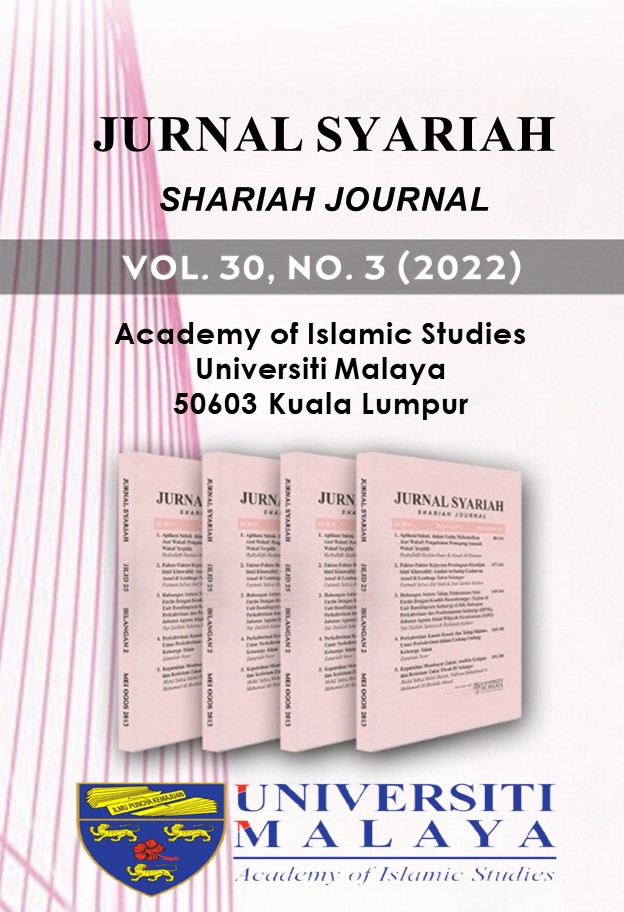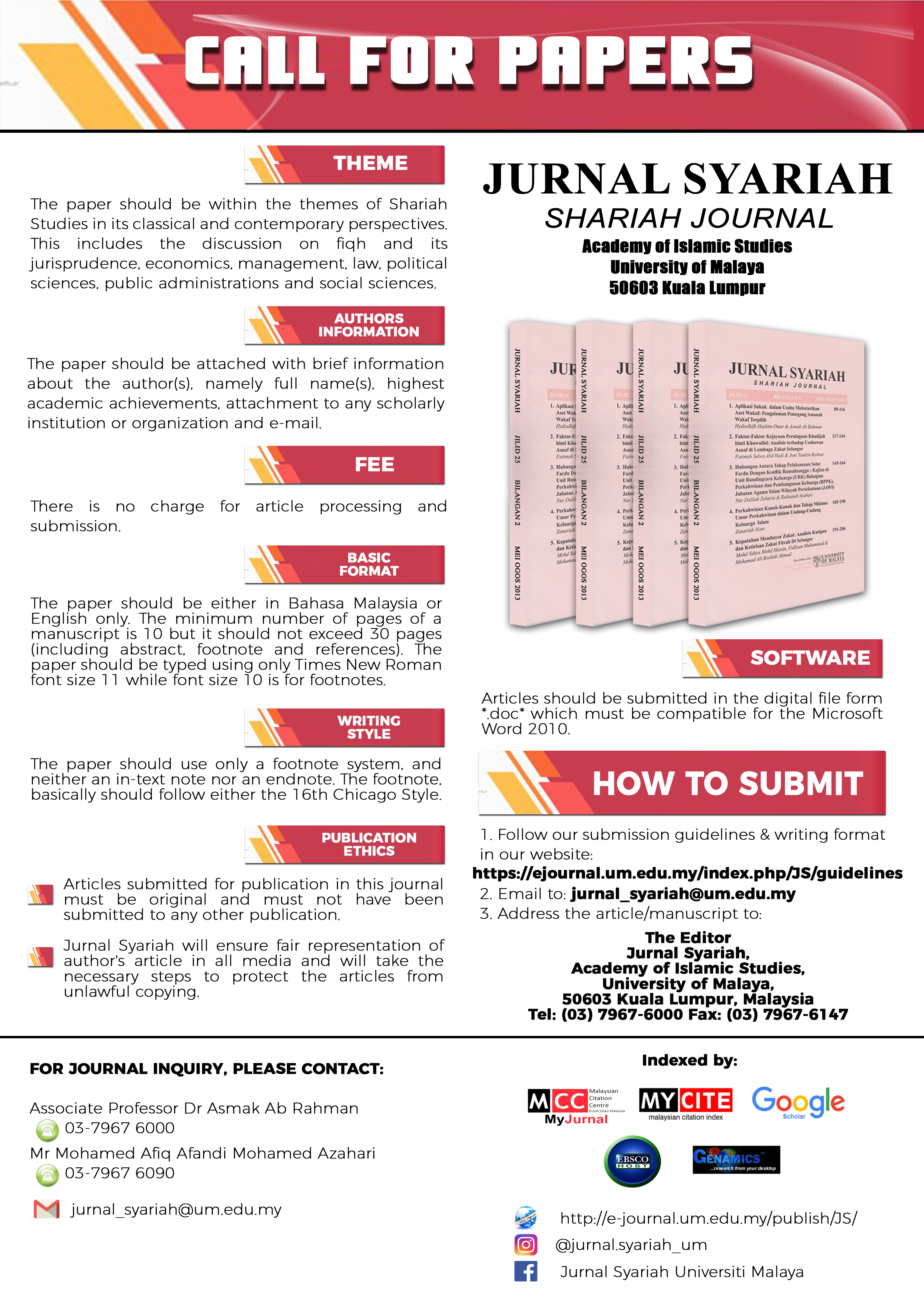ADMISSIBILITY OF NON-MUSLIMS EVIDENCE IN CASES INVOLVING MUSLIM PARTIES IN NIGERIA COURT: A CURSORY EXAMINATION OF QUR’AN CHAPTER 5 VERSE 106
DOI:
https://doi.org/10.22452/syariah.vol30no3.2Keywords:
admissibility, Muslim cases, non-Muslim evidence, Shari‘ahAbstract
The interpretation of Qur’an chapter 5 Verse 106 created a lot of divergent opinions among the early Muslim jurists, especially as regards the admissibility of the evidence of non-Muslims (people of scriptures) in cases involving Muslim parties. While some jurists reject their evidence on the basis that the verse in contemplation has been abrogated, others accepted it in line with the letters and spirit of the Qur’an provision solely, that is, in cases of bequest, on a journey and where Muslims are not available. There is also another candid but liberal opinion that allows such evidence in all circumstances where necessity dictates for same. Does this classical discourse represent the same position of our present society, or is it possible to adopt any of the classical arguments to our current situation, especially in Nigerian society where Muslims and people of other faith (especially Christians) intermingled in several affairs of life? What then will be the situation of the evidence of people who do not qualify as ‘people of scriptures’? This piece, through doctrinal analysis, founds that the classical jurists have exhausted all possible argument and their positions (depending on the school) could be adopted depending on the circumstance of each society and the necessity of each transaction. It is concluded that Muslims should be wary and conscious of the company to keep so as not to forestall compliance with the dictate of Shari‘ah.
Downloads
References
Abu Bakr Jābir al-Jaza’irī, Minhāj al-Muslim (Riyad: Dār al-Salām, 2001).
Abd al-‘Aziz Badawi, Al-Wajīz fī-Fiqh as-Sunnah wa al-Kitāb al-‘Azīz, Trans. Jamall al-Din M. Zarabozo (Riyad: II PH, 2007).
Abdullateef F. Kamaldeen, Comparative Analysis of the Jurisdiction of Sharia Court of Appeal and Customary Court of Appeal in Nigeria (LL.M Thesis, Department of Islamic Law, Faculty of Law, University of Ilorin, 2019).
Al-Maliki Ibn Farhun, Tabṣirat al-Ḥukkām, fī Usūl al-Aqdiyyah wa-Manāhij al-Ahkām (Bayrut: al-Maktabah al-Aṣirīyah, 2011).
Al-Hafiz Ibn Kathīr, Tafsīr al-Qur’an al-Azīm, trans. Mahdi al-Sharif (Bayrut: Dār al-Kutub al-‘Ilmiyyah, 2006)
Anwarullah, The Islamic Law of Evidence (New Delhi: Kitab Bhavan, 2000) 1st ed.
Area Courts Law, Cap. A9, Laws of Kwara State. (2006).
Area Court Law, (1968).
Area Court (Civil Procedure Rules) (1971).
As-Sayyid Sābiq, Fiqh al-Sunnah (Lebanon: Dār al-Harb Fikr, 1983), 4th ed., vol. III.
B. Tarek, ‘Towards a Contemporary View of Islamic Criminal Procedures: A Focus on the Testimony of Witnesses’ Arab Law Quarterly vol. 23/3 (2009).
Constitution of the Federal Republic of Nigeria (1999) as amended.
Evidence Act (2011).
Hanafi Adekunle Hammed, Islamic Law of Evidence and Administration of Justice in Nigeria (Shar’iyat al-Islamiyyat fi Idharat âdhalat Walida-hijaj bi-dawlat Nigeria) (Lagos-Nigeria: Princeton & Associate Publishing Co. Ltd., 2022).
Ibn Qayyim al-Jawzī, al-Turuq al-Ḥukmiyyah fī al-Siyāsah al-Shar‘iyyah al-Islāmīyyah, vol. 1 (n.p. Dār `Alim al-Fawa’id, n.d.).
Ibn Qayyim al-Jawzī, I‘lām al-Muwaqqi‘in an-Rabb al-‘Alamīn, vol. 2 (n.p.: Dār Ibn al-Jawzi, 1423AH).
Imran Hassan Khan Nyazee, Islamic Jurisprudence ‘Usūl al-Fiqh’ (India: Adamu Publishers & Distributers, 2006).
Jalal al-Din al-Mahalli & Jalal al-Din al-Suyūti, Tafsīr al-Jalālayn, trans. Feras Hamza (Jordan: Royal Ala al-Bayt Institute for Islamic Thought, 2007).
M. A. Ambali, The Practice of Muslim Family Law in Nigeria (Zaria: Tamaza Publishing Co. Ltd., 2003), 2nd ed.
M. A. Ambali, Ash-Shahādah: Evidence in Islamic Law (Ijebu-ode: Shebiotimo Publications, 2005).
M. A. Deribe and T. M. Buba, ‘Appraisal of the Admissibility of Electronic Evidence in Nigeria and the Possibility of its Application Under Sharia’ http://www.unimaid.edu.ng/per/Journals-oer/Law/Private%20Law/20.pdf :249
Mohammed Ali, The Religion of Islam (U.A.E: National Publication & Printing House, n.d.).
Muhammad Ibn Ṣaliḥ al-‘Uthaymīn, Sharḥ Arba‘ūna an-Nawawiyyah (Riyad: Dār-Tharayā li al-Nashra, 2004).
Muhammad Aliy Asayis, Tafsīr Ayah al-Ahkām (Cairo: n.p., n.d.) vol. III, 226.
Se eI. I. Lukanshuk, ‘The Principle Pacta Sunt Servanda and the Nature of Obligation under International Law,’ The American Journal of International Law, vol. 83/3 (1989).
Sharia Court of Appeal Law, Cap. S4 Laws of Kwara State (2006).
Sharia Court of Appeal Rules. (2006).
Downloads
Published
How to Cite
Issue
Section
License
Copyright (c) 2023 Jurnal Syariah

This work is licensed under a Creative Commons Attribution-NonCommercial 4.0 International License.
COPYRIGHT: All rights reserved. Not allowed to be reproduced any part of articles and contents of this journal in any form or by any way, whether electronic, mechanical, photocopying, recording or otherwise without permission in writing from the Chief Editor, Jurnal Syariah.



















